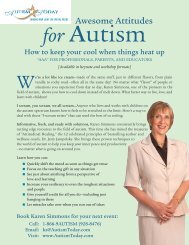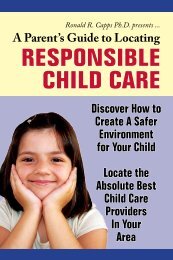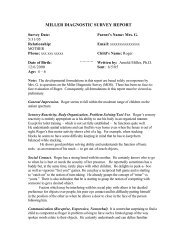Advice For Parents Of Young Autistic Children - Autism Today
Advice For Parents Of Young Autistic Children - Autism Today
Advice For Parents Of Young Autistic Children - Autism Today
You also want an ePaper? Increase the reach of your titles
YUMPU automatically turns print PDFs into web optimized ePapers that Google loves.
A related description of medical testing and treatment is also available at http://www.eas.asu.edu/~autism<br />
Routine medical tests are usually performed by traditional pediatricians, but they rarely reveal problems in autism<br />
that can be treated. Genetic testing for Fragile X syndrome can help identify one possible cause, and this testing is<br />
typically recommended when there is mental retardation in the family history. Many physicians do not conduct<br />
extensive medical testing for autism, because they believe, incorrectly, that the only useful medical treatments are<br />
psychiatric medications to reduce seizures and behavioral problems.<br />
Some of the major interventions suggested by DAN! practitioners include:<br />
• Nutritional supplements, including certain vitamins, minerals, amino acids, and essential fatty acids<br />
• Special diets totally free of gluten (from wheat, barley, rye, and possibly oats) and free of dairy (milk, icecream,<br />
yogurt, etc.)<br />
• Testing for hidden food allergies, and avoidance of allergenic foods<br />
• Treatment of intestinal bacterial/yeast overgrowth<br />
• Detoxification of heavy metals<br />
PSYCHIATRIC MEDICATIONS<br />
The various topics covered in this overview paper for parents of young autistic children represent, for the most part,<br />
a consensus of the views, based on research and personal experience, of all four authors. However, the authors<br />
differ in their opinions on the role of psychoactive drugs should play. We will present you with the conflicting<br />
opinions, so you can decide for yourself.<br />
Grandin has a relatively accepting position on the use of psychiatric medications in autistic children. She feels that<br />
it is worthwhile to consider drugs as a viable and useful treatment. Rimland and Edelson, on the other hand, are<br />
strongly opposed to the use of drugs except as a possible last resort, etc. – They feel the risks are great and<br />
consistently outweigh the benefits. Adams has an intermediate view.<br />
Grandin<br />
There are no psychiatric medications for “autism,” but there are many psychiatric medications used for treating<br />
specific symptoms often found in autism, such as aggression, self-injury, anxiety, depression, obsessive/compulsive<br />
disorders, and attention deficit/hyperactivity disorder (ADHD). These medications generally function by altering<br />
the level of neurotransmitters (chemical messengers) in the brain. There is no medical test to determine if a<br />
particular medication is called for; the decision is based on the psychiatrist’s evaluation of the patient’s symptoms.<br />
This is a “trial and error” approach, as dosages need to be adjusted differently for each person, and one medication<br />
may be ineffective or have negative effects while others are helpful.<br />
<strong>For</strong> some classes of drugs the doses which are successful for reducing symptoms, such as aggression or anxiety, are<br />
much lower for those with autism than for normal people. <strong>For</strong> the SSRI drugs, such as Prozac (Fluoxetine), Zoloft<br />
(Sertraline), and other and other antidepressants, the best dose may be only one-third of the normal starting dose.<br />
Too high a dose may cause agitation or insomnia. If agitation occurs, the dose must be lowered. The low dose<br />
principle also applies to all drugs in the atypical or third generation antipsychotic drug class, such as Risperdal<br />
(Risperidone). The effective dose will vary greatly between individuals. Start low and use the lowest effective<br />
dose. Other classes of drug, such as anticonvulsants, will usually require the same doses that are effective in normal<br />
individuals.<br />
Psychiatric medications are widely used to treat the symptoms of autism, and they can be beneficial to many older<br />
children and adults. However, there are concerns over their use. There is relatively little research on their use for<br />
children with autism. There are almost no studies on the long-term effects of their use, especially for the newer<br />
medications, and there is a concern that their long-term use in children may affect their development. They treat the<br />
symptoms, but not the underlying biomedical causes of autism. One must balance risk versus benefit. A drug should<br />
have an obvious positive effect to make it work the risk. In order to observe the effect of a drug, do not start a drug<br />
at the same time as you start some other treatment.<br />
6





